Let’s Chat! Women’s Rights, Then & Now
Welcome, everyone!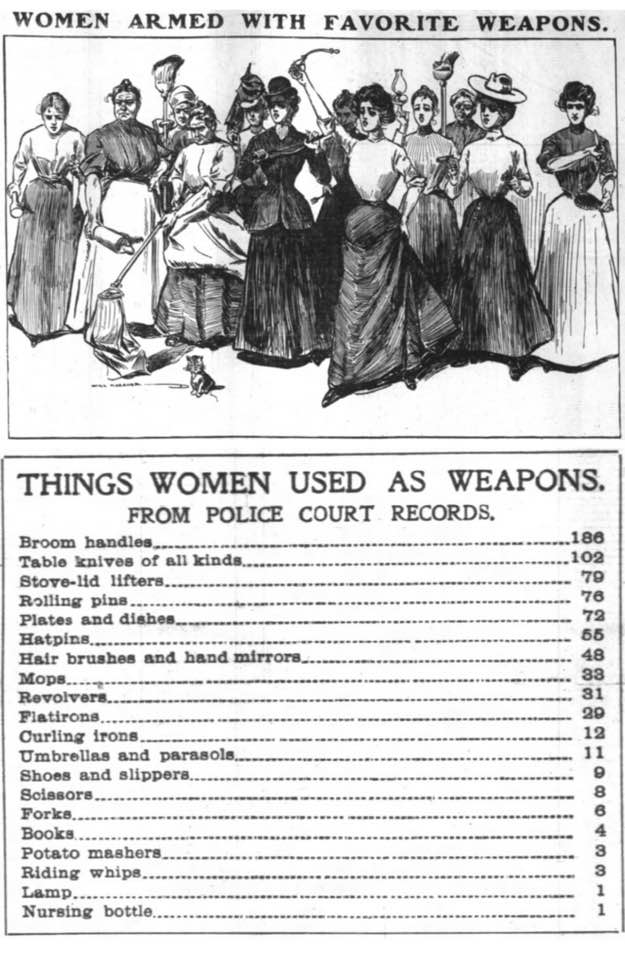
When I first began brainstorming about a novel set in early twentieth-century Indian Territory, the time and place of my maternal grandmother’s marriage and motherhood, the research took me again and again to the suffrage movement.
I quickly learned the first meeting of reformers for the purpose of addressing equal rights for women–including the vote–was held in Seneca Falls, New York in 1848. This was much earlier than I would have guessed. Out of that first convention came the Declaration of Sentiments, which demanded equal social status and legal rights for women.
Frankly, the women’s movement had never interested me. My impression of suffragists? They behaved in unseemly, shameful ways, as my mother would put it. I assumed they were pagans–unbelievers at the very least–who claimed neither Jesus nor morals.
After all . . .
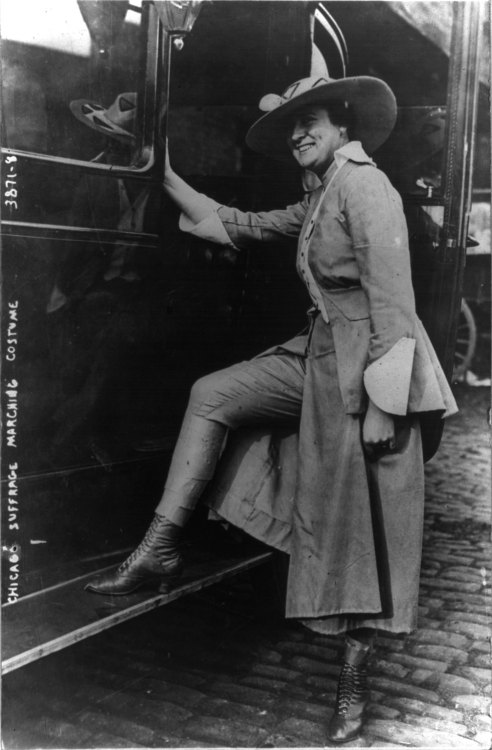
- Firebrands stopped traffic and defied the law.
- Hellions took bats to liquor bottles in saloons.
- Rabble-rousers drew crowds and instigated civil disobedience that led to arrests.
- Others jeered men at voting sites, the president in the White House, and all levels of office holders, sometimes receiving ripe tomatoes or eggs in their faces as a result.
- Some advocated for “free love” and abortion on demand and wouldn’t be caught dead in church
- Still others used every sort of household implements as weapons to advance the cause
None of which I could square with Scripture:
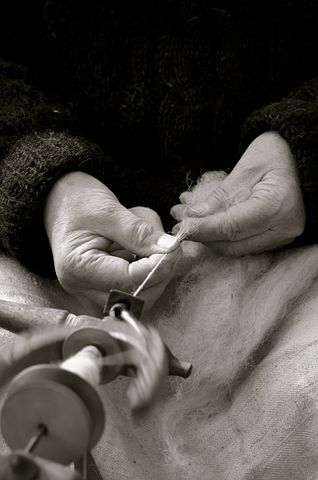
- 1 Thessalonians 4:11 (AMP) – make it your ambition to live quietly and peacefully, and to mind your own affairs
- 1 Timothy 2:1-2 (AMP) – I urge that petitions (specific requests), prayers, intercessions (prayers for others) and thanksgivings be offered on behalf of all people, for kings and all who are in [positions of] high authority, so that we may live a peaceful and quiet life in all godliness and dignity.
- Ephesians 5:19-20 – Paul identifies hostility, strife, jealousy, fits of anger, disputes, dissensions, factions, and riotous behavior as part of the sinful nature.
- Ephesians 5: 22-23 – Paul highlights the fruit of the Spirit as love, joy, [inner] peace, patience [not the ability to wait, but how we act while waiting], kindness, goodness, faithfulness, gentleness, self-control. Against such things there is no law.
- Titus 2:3-5 – Older women similarly are to be reverent in their behavior, not malicious gossips nor addicted to much wine, teaching what is right and good, so that they may encourage the young women to tenderly love their husbands and their children, to be sensible, pure, makers of a home [where God is honored], good-natured, being subject to their own husbands, so that the word of God will not be dishonored.
To make matters worse . . .
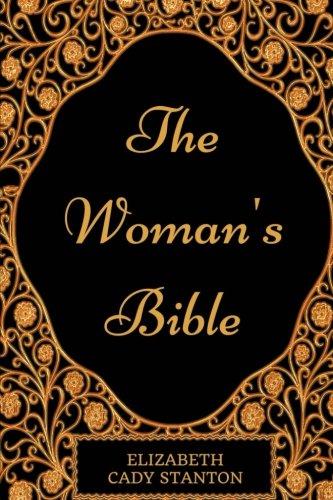
One of the most important leaders of the movement, Elizabeth Cady Stanton, had declared the Holy Bible degraded women from first page to last. Therefore, she came up with her own version, one she revised to eliminate what she considered degradation to women. She named it The Woman’s Bible.
Some women in the movement accepted this maimed version of Holy Scripture. Fortunately, most did not. By the turn of the twentieth century, it was largely ignored. And the National American Women Suffrage Association disassociated itself from the publication. However, many believed the harm was done, as it had marginalized the cause.
How These Realities Translated to the Women of Rock Creek
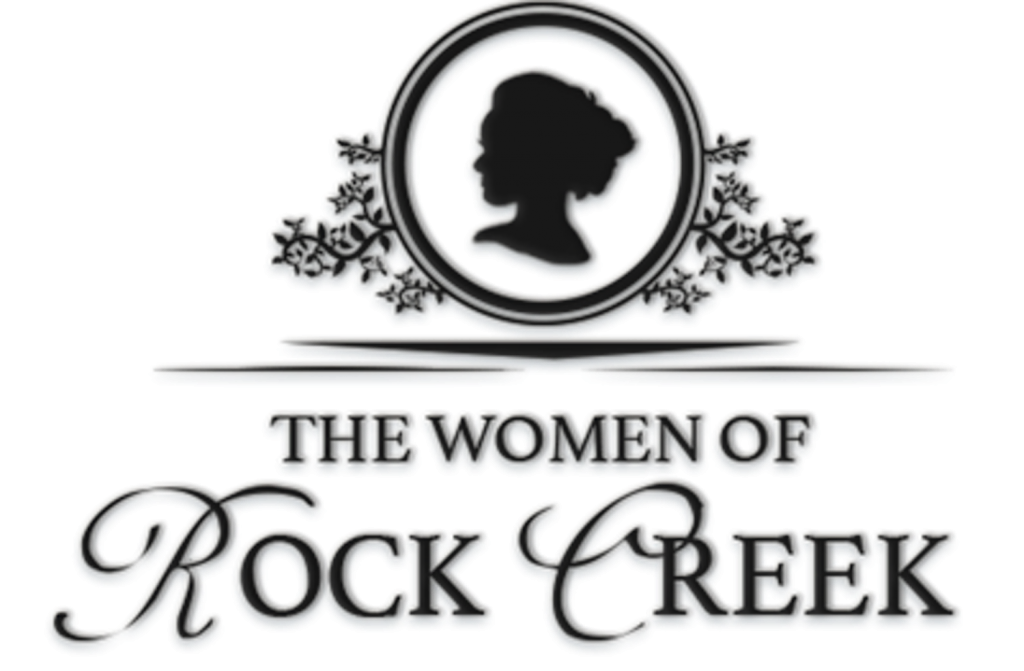 Right away, I found historically significant rifts occurred among women nationwide over the methods they would utilize to achieve their goals. I began asking myself if women devoted to Jesus Christ and Holy Scripture participated in the movement. (Turned out, many devoted followers of Jesus supported the cause.) How did they reconcile their own or their cohorts’ sometimes boisterous, disruptive–even law-breaking–behaviors with Scripture?
Right away, I found historically significant rifts occurred among women nationwide over the methods they would utilize to achieve their goals. I began asking myself if women devoted to Jesus Christ and Holy Scripture participated in the movement. (Turned out, many devoted followers of Jesus supported the cause.) How did they reconcile their own or their cohorts’ sometimes boisterous, disruptive–even law-breaking–behaviors with Scripture?
Enter . . . Imagination
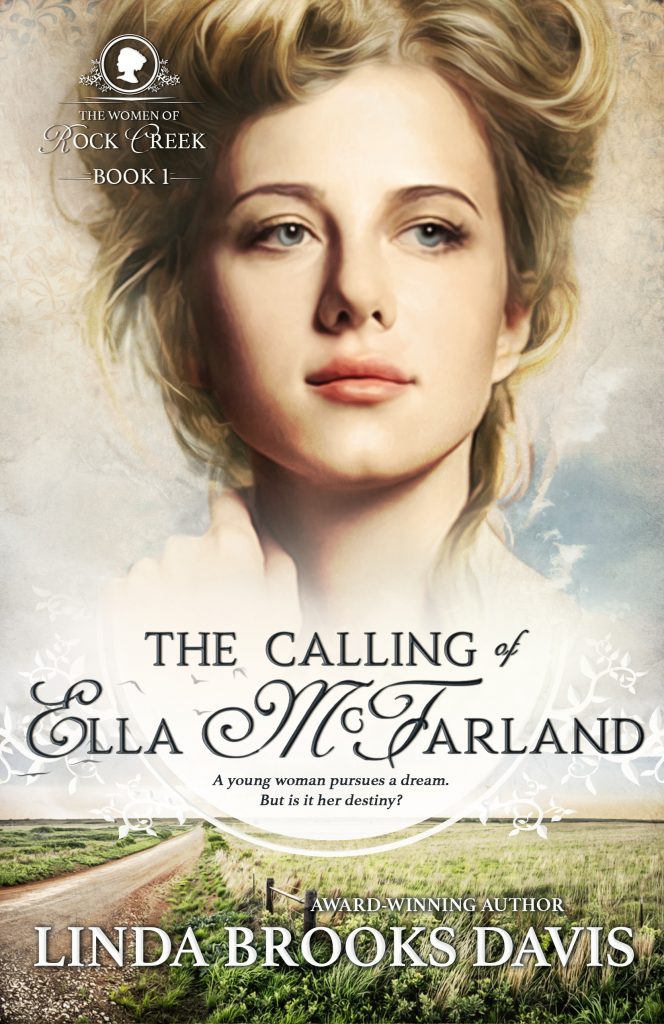 Ella Jane McFarland was born in midst of my “brain storms” over these questions. And asking myself “what if?” questions about the original Ella Jane, my grandmother.
Ella Jane McFarland was born in midst of my “brain storms” over these questions. And asking myself “what if?” questions about the original Ella Jane, my grandmother.
- What if she had continued her education beyond third grade?
- Or received a college education?
- What if she had been exposed to the suffrage movement, found herself smitten, and couldn’t keep her mouth closed?
- Or grappled with reconciling her place as a Jesus follower with her role as a suffragist?
- What if she believed she had received a calling from the Lord to teach women and girls and help them find their voices in a male-dominated world?
- And what if Ella Jane McFarland found herself in the midst of a group of “rabble-rousing” women? How would she handle it?
Heads up: I’m giving away the Women of Rock Creek series in digital format to someone who joins the conversation below. This include Book 3, which is due to release in June.
Update: Winners – Judi M, Athena M, & Marilyn R.
Women’s hot-button issues have been around a long time.

Eve and Women’s Rights (Genesis 2)
- Created by God (Genesis 2)
- To be a helper for Adam
- In tending the Garden
- Lusted for wisdom (power) (Genesis 3)
- Result: a double curse
- pain in childbirth
- her husband ruling over her
- Result: a double curse
King Solomon’s Worthy Woman and Women’s Rights (Proverbs 31):
- Selected wool and flax and worked with eager hands.
- Was like the merchant ships, bringing her food from afar.
- Got up while it was still night to provide food for her family and portions for her female servants.
- She considered a field and bought it; out of her earnings she planted a vineyard.
- She set about her work vigorously; her arms were strong for her tasks.
- She saw that her trading was profitable, and her lamp did not go out at night.
- In her hand she held the distaff and grasped the spindle with her fingers.
- She opened her arms to the poor and extended her hands to the needy.
- When it snowed, she had no fear for her household; for all of them were clothed in scarlet.
- She made coverings for her bed; she was clothed in fine linen and purple.
- Her husband was respected at the city gate, where he took his seat among the elders of the land.
- She made linen garments and sold them, and supplied the merchants with sashes.
- Clothed with strength and dignity, she could laugh at the days to come.
- She spoke with wisdom.
- Faithful instruction was on her tongue.
- She watched over the affairs of her household.
- She did not eat the bread of idleness.
- Her children arose and called her blessed; her husband also, and he praised her:
- Many women did noble things, but she surpassed them all.
- Charm was deceptive, and beauty was fleeting; but a woman who feared the Lord was to be praised.
- She was to be honored for all that her hands had done.
- Her works were to bring her praise at the city gate.
Questions About Women’s Rights:
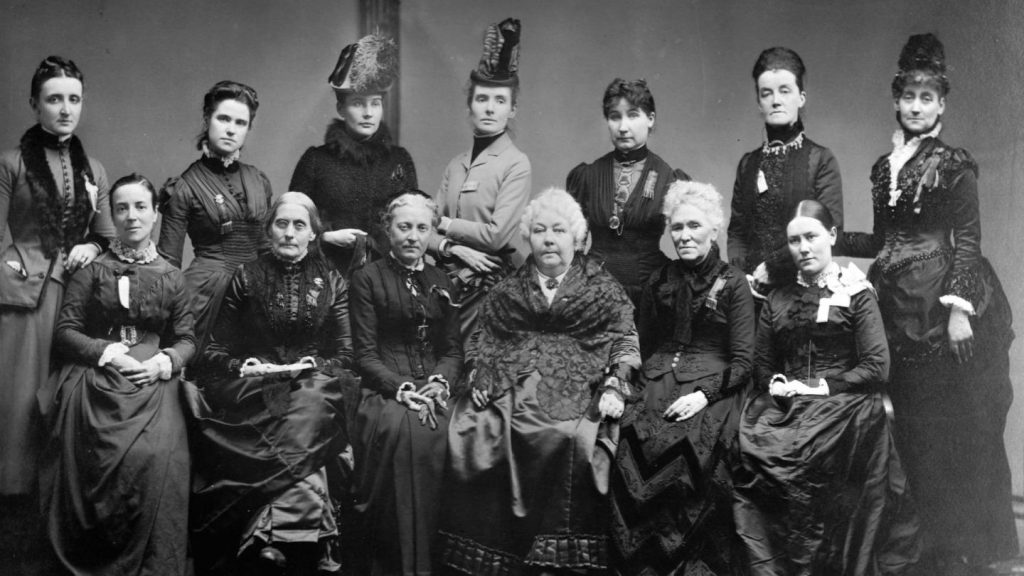
- Is a modern wife’s purpose still to be her husband’s helper?
- If so, who decides how she will help?
- Her husband?
- Herself?
- God?
- If not, what is her purpose?
- Who decides?
- Herself?
- God?
- Someone else?
- Who decides?
- If so, who decides how she will help?
- Is an unmarried woman’s purpose to help a man/men?
- If so, which man/men?
- If not, what is her purpose?
- Who decides?
- Herself?
- God?
- Someone else?
- Who decides?
The Point: Women’s Rights
From the mid-nineteenth century through 1920, American women demanded the vote to achieve equal standing with men in property and business ownership whether married or single, holding public office, serving on juries, job opportunities, receiving equal pay for equal work, education, and many others.
Now women can walk into polling sites and cast ballots unhindered because women before them . . .
- Gathered in large and small groups inliving rooms
- schools
- office buildings
- town halls
- civic centers
- parks
- Met with
- clubs
- church groups
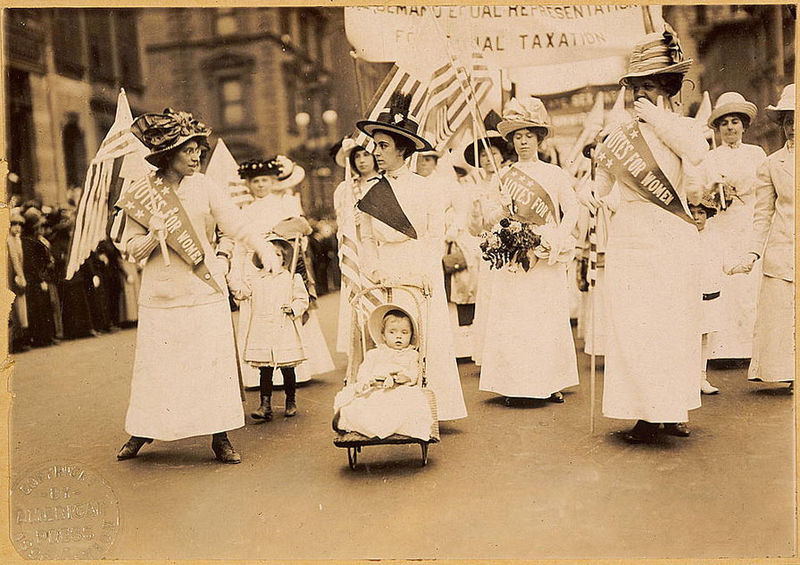 civic organizations
civic organizations- lawmakers
- Paraded
- down streets
- along sidewalks
- around town squares
- Spoke from
- wooden crates
- podiums
- automobiles
- stages
- sidewalks
- street corners
- Picketed as
- silent sentinels
- boisterous disrupters of the peace
- motorists touring the country
- Endured
- arrests
- hunger strikes
- name calling
- profanity
- physical assaults
- banishment from organizations
- ostracization
- every weather condition
Did each woman participate in each demonstration without sin? I doubt it. Did some women participate without sin? I would guess so. Is it my place to examine those women’s actions through a 100-150-year-old lens? Or am I to take what they accomplished–the good and the evil–before the throne of God’s grace and apply the sacred wisdom He provides in His Word. And thereby find my place in the great stream of equal justice for all?
P.S. Did you know American women chose the term “suffragist” to set themselves apart from the very militant “suffragettes” in England?
I take this privilege for granted.
I note voting sites and hours in newspapers and on the Internet and mark my calendar. But I rarely think of the women who purchased that privilege by expending their time, talent, and treasure.
Take-Away Thoughts About “The Temptation”
This 1911 sketch appeared in Life magazine. First I was confused, then stunned, and finally angry. Check out the questions it evoked in my mind below:
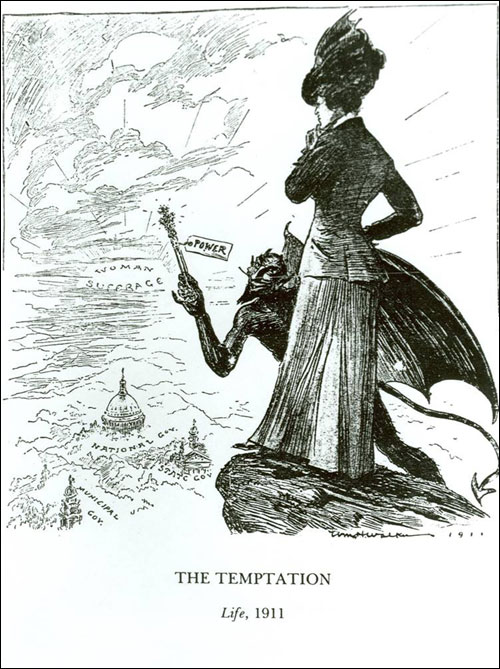
- As a Christian woman considering this powerful sketch printed in Life magazine in 1911, I ask myself the following:
- Was desiring the vote in 1911 tantamount to lusting for power?
- Is casting my vote a power grab today?
- Is a woman more apt to lust for power than a man?
- Would an artist have sketched—or a magazine or newspaper printed—this artwork if it featured a man in place of the woman?
- Should this conversation matter to Christians? Why or why not?
- How have times changed in regards to women’s rights
- Have God’s expectations of women changed?
What are your thoughts on this thought-provoking sketch?

There was good and bad with the movement yes we can vote but some other things I think are better fitting for men to do in my opinion. I am sure there where many women who lived by the word of God when the movement started and continued while fighting for women’s rights;but like today it’s the ones who break the laws or yells loudest and shows the evil side that gets the most attention. It is awesome the history you share as we have heard things that about that time but don’t know everything that happened.
I’m glad you appreciate the history behind the stories. I love sharing it. I’ve been astounded by some of the scrapes some of the women got into. I would have agreed that women deserved to vote, but I would have struggled with some of the methods. It’s fun to imagine it all through stories. Thanks for stopping by, Judi!
Thank you for sharing history and scriptures to ponder. Thankful God’s Word does not change.
My thoughts
The devil 😈 is with us at every turn
God is Power and the devil wants it .
She looks like she is tempted
Thanks for joining in, Athena. I was a bit stunned to find this 1911 sketch in Life magazine. It so blatantly shows woman suffrage as tantamount to women lusting for power. I couldn’t help but wonder if the sketch would have been printed if it featured a man rather than a woman. I imagine some women lusted for the power they saw inherent in the vote. But I know others saw it simply as an opportunity to have a voice in their governance and to get some laws passed that benefitted women and children. I believe that good, even righteous goal, has been twisted and stretched to such an extent that some outcomes in recent decades have, indeed, been evil, just as the sketch shows. But have those ungodly outcomes resulted from women having the vote? Or men? Or both? People were scratching their heads and wondering what the world was coming to in those days. As we are. God have mercy on our country that’s drifted so far from Him.
Hi, Marilyn. So glad to see you in our chat circle. I have found the history surrounding the years of my books exceedingly interesting. Of course, the suffrage movement was on everyone’s minds at that time. But the 19ll sketch in Life magazine really took me aback. I was quite amazed that it would be acceptable for an artist–and popular publication–to present the desire for the vote as evil for women (but, assumedly, not for men).I imagine some women lusted for the power they saw inherent in the vote.(But didn’t men also?) I know other women saw it simply as an opportunity to have a voice in their governance and to get some laws passed that benefitted women and children. I believe that good, even righteous goal, has been twisted and stretched to such an extent that some outcomes in recent decades have, indeed, been evil, just as the sketch shows. But have those ungodly outcomes resulted from women having the vote? Or men? Or both? People were scratching their heads and wondering what the world was coming to in those days. As we are. God have mercy on our country that’s drifted so far from Him. Thanks for join in!
Amen, Marilyn! Thankful God’s Word doesn’t change. And neither does He.